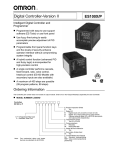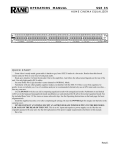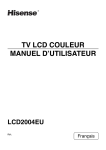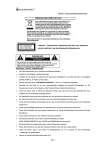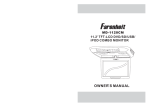Download PYLE Audio Mobile Audio System Specifications
Transcript
.pyleaudio.com P 780P 7 BAND PARAMETRIC EQUA~I~EIR Contents 1 . FEATURES ............................................................................................. 1 2. PRECAUTIONS •••••••••••••••••••••••••••••••••••••••••••••••••••••••••••••••••••••••••••••••••••••• 2 Installation .................................................................................................................................................................., 2 :I. <:ONTROL.S ............................................................................................... 3 4. OPERATIONS •••••••••••••••••••••••••••••••••••••••••••••••••••••••••••••••••••••••••••••••••••••••••••• 4 Setting system volume ...................................................................................................................................... 4 Adjusting the controls ........................................................................................................................................, 4 Setting the low-pass frequency ................................................................................................................... 5 Connecting an MP3 player or video unit ............................................................................................. 5 Care and maintenance ...................................................................................................................................., 5 5. INSTALLATION AND WIRING ...................................................................... 6 What is included in the box ............................................................................................................................ 6 Before starting .......................................................................................................................................................... 6 Tools and additional components ............................................................................................................., 7 Mounting diagram ................................................................................................................................................ 7 Wiring diagram ....................................................................................................................................................... 8 6. TROUBLESHOOTING ................................................................................. 9 The unit does not work; no lights ............................................................................................................... 9 Sou nd is distorted ................................................................................................................................................., 9 No sound coming from the unit ................................................................................................................... 9 7. GLOSSARY ...............................................................................................110 8. SPECIFICATIONS ....................................................................................... 11 This Equalizer is a 7-band stereo equalier/crossover specifically created for the mobile environment. This Equalizer provides powerful features in a compact size: • Seven equalization bands (50Hz, 125Hz,320Hz, 750Hz, 2.2KHz, 6kHz, and 16 kHz), each frequency adjustable from -12 to + 12dB (-15 to + 15dB for subwoofer frequencies) • Subwoofer output uses a built-in 18dB per octave electronic crossover fixed at 60Hz or 120Hz. • Three stereo RCA outputs to drive front, rear, and subwoofer audio amplifiers • An auxiliary stereo RCA input for use with portable devices, such as an MP3 player or DVD player • Separate controls for master volume, subwoofer volume (sub level), front/rear fader, and selection of main or auxiliary inputs • Extended frequency response from 20 Hz to 30 kHz with exceptional 100 dB signal-to-noise performance • Dual light selectable ( orange red and blue) • Gold-plated RCA connectors to ensure the best audio signal output • ISO mounting holes and removable trim ring for custom installation 1 • Do not operate this product in ways other than those described in this manual. • Do not disassemble or modify this unit. • Do not pour liquid or poke foreign objects into the unit. Water and humidity may damage internal circuitry. • If the unit becomes wet, turn off all power and ask your authorized dealer to clean or service the unit. Failure to observe these precautions may damage your car, the monitor, or the video source, and may void the warranty. Installation Installation of mobile audio and video components requires experience with a variety of mechanical and electrical procedures. Although this manual provides general installation and operation instructions, it does not show the exact installation methods for your particular vehicle. If you do not have the required knowledge and experience to successfully complete the installation, consult an authorized dealer about professional installation options 2 3. CONTROLS AUX (auxiliary) switch: Press to select auxiliary or main inputs Subwoofer volume SUB EVEL Equalizer gain controls VOLUME 00000000000 Master volume To adjust gain, rotate control to desired setti ng Fader control: Use to balance sound between front and rear speakers Frontpanelconuo~ Sub out R L Main in R L Front out R L R L Rear out R L Auxin Rear panel connections Light selectable switch(orange red and blue) low-pass freqency switch AUX gain control: Gain adjustment for left and C60/120Hz) right auxiliary input 3 4. OPERATIONS Setting system volume 1. Turn the master volume and subwoofer level controls to their minimum settings. 2. Turn the source unit on and increase the volume until you hear distortion. 3. Reduce the volume to just below the distortion point (approximately 80% of full volume). This is the maximum usable musical signal for the source unit. Turning the volume beyond this point increases noise and distortion without increasing the musical signal. Note Once you set the source unit volume, do not change it, Always use the volume control on the Equalizer as the master(main) volume control, The Equalizer has better electronics, a higher sound to noise ratio, and is more linear than the volume settings on any source unit available. Adjusting the controls This Equalizer provides a graphic adjustment band for each of seven frequency ranges: sub, low, mid, mid-high and high frequency. You can adjust the center of each frequency band to fine tune the acoustical response to your vehicle's interior. 1. Set all frequencies to the center position. The small dot on the control knob should be set at 12 o'clock. 2. Play your favorite music track and adjust the individual controls to suit your taste. Avoid extreme settings, which can distort musical peaks. 3. Increase or decrease the equalizer gain controls to suit your taste. 4. If your system includes a subwoofer, slowly increase the subwoofer level until you hear a solid bass. 5. If your system includes rear speakers, adjust the fader control to add rear sound. Set it so most of the music comes from the front and only fills the rear. 4 Setting the low-pass frequency Set the low pass frequency switch on the top of the Equalizer to either 60Hz or 90 Hz depending on the subwoofer and subwoofer amplifier requirements. Connecting an MP3 player or video unit 1. Plug the MP3 player or video unit into the auxiliary RCA input on the back of the Equalizer unit. 2. Make sure the auxiliary button on the front of the unit is out, ready to receive input from the main RCA input (not the auxiliary RCA input). 3. Turn the master volume to a normal listening level. 4. Press the play button on the auxiliary source. 5. Push in the AUX button to change to the auxiliary source. 6. Using a small flathead screwdriver, adjust the AUX gain controls located on the top of the unit so that the volume of the auxiliary source matches the volume of the main source. Care and maintenance Cleaning the cabinet Use a soft, dry cloth to gently wipe dust and dirt from the unit. Do not use benzene, thinner, car cleaner, or'ether cleaners. These substances may damage the unit or cause the paint to peel. Servicing the equalizer/crossover unit In the event that trouble arises, never open the case or disassemble the unit. The internal parts are not serviceable by the user. Opening any components will void the warranty. WARNING! Changes or modifications to this product that are not approved by the manufacturer will void the warranty and will violate FCC approval. 5 Read these instructions and the following precautions carefully. What is included in the box In addition to this manual, the box contains: • 7-band graphic equalizer • Warranty card • 2 mounting brackets • User manu • 8 Phillips-head screws Before starting Mounting precautions This Equlizer can be mounted next to the source unit or under the dash using the mounting brackets. The front panel controls should be easily accessible from the driver's seat. In addition: • This unit requires additional mobile audio components for proper operation. • Always use great care when attaching anything to a vehicle! Check clearances in front of, behind, and on both sides of the planned installation before drilling any holes or installing any screws. Wiring precautions Disconnect the ground (-) terminal on the vehicle's battery. WARNING! To prevent short circuits during installation, always discon- nect the vehicle's negative (-) battery lead before making any connections. • This unit is exclusively for vehicles with a negative ground, 12V battery system. • A good chassis ground connection is critical to minimize resistance and avoid noise problems. Use the shortest wire possible and securely connect it to the car chassis and the source unit ground. • When routing RCA cables, keep the cables away from the power cables and output speaker wires. • If you are using a source unit without a remote turn-on lead, the this unit can be turned on with a switched accessory lead. This accessory power source is located in the factory harness at the back of the radio. This lead turns on and off with the ignition key. • Do not open the case. There are no user-serviceable parts inside. If you require assistance, consult your dealer or an authorized dealer service center. 6 Tools and additional components You will need: • A Phillips-head screwdriver when mounting the unit in the vehicle. • A small flat-head screwdriver to adjust the AUX gain controls if you connect an MP3 player or video source. • High-quality RCA input and output cables. Extra cable can cause signal loss and act as an antenna for noise. Use only highquality RCA cables that are no longer than necessary to make a direct connection with the source unit and amplifiers. Mounting diagram 7 Wiring diagram @ Sou rce unit Remote tum-on ~ Chassis ground (bare metal) L.!::==::::1 Front out Ma'in in R L R R L Aearout , ~ Front ~rear amp Subourt RL L R L Auxin - g~. Sub - .. '~ ~ ~ 8 6. Troubleshooting The unit does not work; no lights The power wires may not be connected. Check the power and ground wiring, then retest. Sound is distorted • The source unit volume may be set too high. Reduce the source unit volume. • • Equalizer gain controls are set too high. Turn the equalizer controls to the center position and listen for distortion again. If the problem still occurs, see your authorized dealer. Speakers may be damaged. Consult your authorized dealer. No sound coming from the unit • The wrong input is selected. Press the AUX switch to turn the main inputs on. • No remote-on. Using a voltmeter, check for + 12V from the remote-on source. 9 Crossover. A device that limits the range of frequencies sent to a speaker or amplifier. Equalization: the process of boosting or cutting sound signal frequencies to improve the quality of the sound. The term comes from the filters used to add back high frequencies at the receiving end of analog transmissions over wires. Equalization band: the frequency range impacted by a specific filter. dB: decibel, a measurement of the relative difference in power or intensity between two acoustic signals Gain control: gain is the amount of amplification (voltage, current or power) of an audio signal expressed in dB Graphic equalizer. a multi-band variable equalizer that uses mechanical controls to adjust amplitude. Hz: Abbreviation for Hertz, a unit of frequency equal to one cycle per second. Octave: the musical principle of dividing sound frequencies into the eight notes of the musical scale. OEM: Original Equipment Manufacturer RCA input/output: port through which sound travels in and out of the system; "RCA" refers to the type of connector, which was originally manufactured by Radio Corporation of America. Slope: how fast the sound changes rated in dBs. The higher the dB number, the faster the frequency drops off. 10 8. Specifications Note The technical data and the design of the equipment may change without prior notice for the sake of technical improvements. Graphic center frequencies: SOHz, 12SHz, 320Hz, 7S0Hz,2.2KHz,6KHz, 16KHz Dual light selectable: orange red and blue Boost/cut: 12dB SIN ratio: 100dB Frequency response: 10Hz-SOkHz +1-1 dB Maximum output voltage: 7V THD: O.OOS% Input sensitivity: SOmV - 3V Head room: 20dB Input impedance: 20kOhms Output impedance: 2kOhms Stereo separation: 82dB/1 kHz Operating voltage: 11V-1SV negative ground Size: 7" wide by 4 1/8" deep by 1" high 11 PRECAUTIONS FOR SAFETY , • .Make sure to read the" manuanor safety precautions before installing unit or accessories. .00 not install unit in location where it may obstruct or cause injury to driver or passengers . .00 not install unit where it may be exposed to high temperatures,moisture,dust or any foreign matter which will damage unit and cause it to malfunction . .00 not watch TV/Monitor while driving. MEMO














